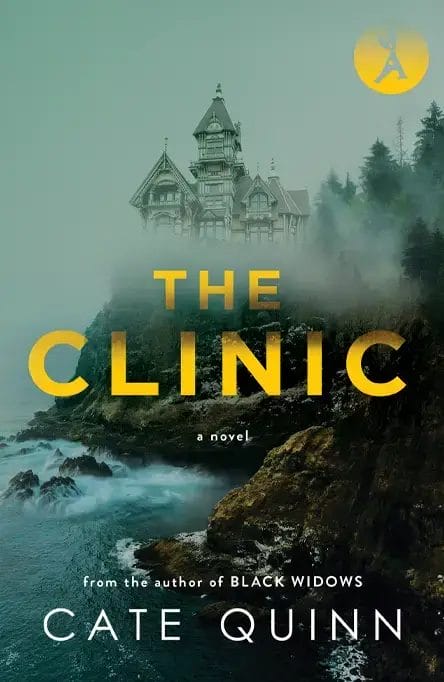

The Clinic
By Cate Quinn
From the critically acclaimed author of Black Widows comes a thriller set in a remote rehab clinic on the Pacific Northwest coast, in which the death of a woman inside prompts her sister to enter the clinic as a patient in order to find the truth. Perfect for fans of Stacy Willingham and Tarryn Fisher!
Meg works for a casino in LA, catching cheaters and popping a few too many pain pills to cope, following a far different path than her sister Haley, a famous actress. But suddenly reports surface of Haley dying at the remote rehab facility where she had been forced to go to get her addictions under control.
There are whispers of suicide, but Meg can’t believe it. She decides that the best way to find out what happened to her sister is to check in herself – to investigate what really happened from the inside.
Battling her own addictions and figuring out the truth will be much more difficult than she imagined, far away from friends, family – and anyone who could help her.
My thoughts:
I received an advance galley of this book courtesy of the publisher via NetGalley in exchange for an honest review.
The premise of this book immediately intrigued me. The idea of a woman willingly checking herself into a rehab facility to uncover the truth about her sister’s death seemed like a thrilling and unique concept. Unfortunately, while the book had its moments, in the end, it didn’t offer any real surprises for me.
The story follows Meg, a casino employee in LA who is struggling with her own addictions thanks to an unhappy childhood and plenty of trauma. When news of her sister Haley’s untimely death at a remote rehab facility in Oregon emerges, Meg is confident that Haley’s death wasn’t a suicide like was announced and is determined to uncover the truth behind the tragedy. She makes the bold decision to go undercover at the very clinic where her sister died, hoping to find answers that no one else seems willing to provide.
The concept of the story is undeniably intriguing, and I was eager to delve into the world of the rehab facility alongside Meg. The author does a commendable job of depicting the challenges faced by people with an addiction and the complex dynamics within such facilities. There is a sense of authenticity in how the author addresses addiction, treatment, and the various methods used to rehabilitate individuals. This makes sense because the author’s note mentions that she was inspired to write this novel after spending time in rehab.
However, my excitement waned as the plot progressed. The twists that were promised in the synopsis felt a bit contrived. Instead of organically unfolding, they seemed conveniently placed to create suspense and intrigue. This left me feeling disconnected from the story and ultimately disappointed. The truth about what really happened to Haley was creative but a bit of a stretch for me to embrace fully.
Furthermore, a lot of the characters lacked depth and failed to resonate with me on an emotional level. Meg, the main character, was the only one that I really liked. She was definitely a complex and engaging protagonist. The story is told from the perspectives of Meg and Cara (a hospital administrator at the clinic), and while I liked Meg, Cara was an interesting choice for a second narrator. I almost felt as though the book may have worked better without Cara’s point of view. I struggled to fully connect with her, which made it difficult to become fully invested in her journey.
Additionally, the pacing of the novel felt uneven. While the initial setup and introduction of the rehab facility were engaging, the middle portion of the book dragged on without much significant development. The narrative seemed to lose momentum, which made it difficult to maintain my interest. The resolution, when it finally arrived, felt rushed and unsatisfying.
Despite these drawbacks, there were aspects of The Clinic that I appreciated. The author’s writing style was engaging, with descriptive prose that brought the setting to life. The exploration of addiction and the challenges faced by those seeking recovery were portrayed with sensitivity and nuance. The novel also touched upon thought-provoking themes such as the pressures of fame and the lengths people would go to protect their secrets.
While this one had an intriguing premise and explored important themes, it ultimately fell short of my expectations. I never felt fully connected to the story, and as I mentioned earlier, the reveal at the end felt forced and unbelievable. However, the author’s writing style and the authentic portrayal of addiction were commendable. While this one may not have been the page-turning, twisty thriller I hoped for, it may still appeal to readers interested in a decent mystery.
Book Club/Book Box:













